Residents were quickly evacuated, but the aftermath of the landslide is also threatening populations outside of the immediately affected area.
Debris and boulders from the landslide have blocked the Hunza River and the Karakorum Highway, the main transportation route in the area. Rising water levels present a growing threat to neighbouring villages both upstream and downstream from the disaster area, and some 20 000 people in the upper part of the valley have been cut off from their major supply route, threatening a shortage of food and other necessities.
 FOCUS Pakistan quickly mobilised its search and rescue and disaster assessment and response teams to villages affected by the landslide. Courtesy of FOCUS
FOCUS Pakistan quickly mobilised its search and rescue and disaster assessment and response teams to villages affected by the landslide. Courtesy of FOCUS“We are still trying to get to these people,” said Fozia Anwar, a female volunteer working with the Focus Humanitarian Assistance (FOCUS) Search and Rescue Team (SART) in Hunza valley. “Unfortunately if we don't, soon, food and other supplies will run short. This is also winter time in the region, so families living without shelter and heating are even more vulnerable.”
Community emergency response teams from Aliabad and Karimabad, Hunza, were the first to respond to the disaster, and were quickly joined by the FOCUS Pakistan SART and Disaster Assessment and Response Team (DART). Inhabitants have been evacuated to Altit and Karimabad where relief camps have been established at local schools. Fifty households were also evacuated from Salmanabad, a village that was identified as high-risk through FOCUS' early warning systems.
Over 1 500 people have been registered at the camps. Pakistan's National Disaster Management Authority (NDMA), the Red Crescent Society and FOCUS Pakistan have distributed relief supplies, including blankets, tents, firewood and basic food items. On a needs-basis, FOCUS also provided warm clothing to the most affected families and addressed gender-specific needs. Aga Khan Health Service, Pakistan has also established a medical camp in Altit, distributing medicines and providing treatment. FOCUS is working closely with other AKDN agencies and the Ismaili Councils for Pakistan and Hunza to ensure that further needs are being met.
Experts from FOCUS Pakistan and NDMA officials undertook aerial assessments of the affected region to evaluate the damage. A jamatkhana, a school and several houses were completely buried by the landslide, which caused destruction to homes, schools, roads, power and water infrastructure and agricultural land. Communication systems in the region have also been disrupted, making it difficult for families and relief workers to share information.
The aftermath of the landslide is also threatening populations outside the immediately affected areas. Much of the debris from the landslide accumulated in the Hunza River, resulting in the creation of a natural dam. Upstream of the dam, water levels are rising quickly and threaten to flood part of Ayeenabad, Shiskat and Gulmit. However, the dam itself may not be stable, and if it collapses, an ensuing flash-flood could severely affect populations living downstream. FOCUS geologists are monitoring the water levels and working with government and other institutions on contingency planning.







